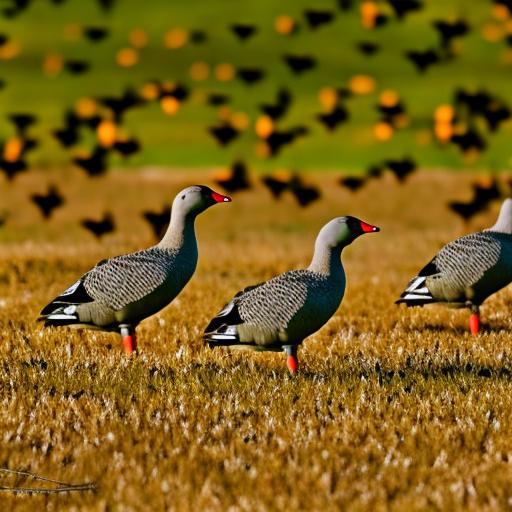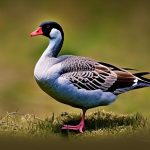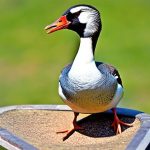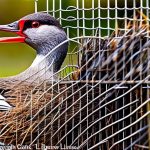Geese are beautiful creatures that are often admired for their graceful presence in natural settings. However, when they invade your lawn or garden, they can quickly become a nuisance. Geese are known for their voracious appetites and can quickly strip a lawn of its grass and plants, leaving behind a mess of droppings that can be unsightly and unsanitary. Additionally, geese can be aggressive and territorial, posing a threat to pets and small children. Their presence can also attract other wildlife, such as ducks and seagulls, further exacerbating the problem. It’s important to understand the potential issues that can arise from having geese on your lawn in order to effectively address the problem.
Geese are attracted to lawns for a variety of reasons. They are drawn to open spaces where they can graze on grass and forage for food. Lawns near bodies of water are particularly attractive to geese, as they provide easy access to both food and water. Additionally, geese are social animals and may be drawn to lawns where other geese have already established a presence. Understanding the reasons why geese are attracted to your lawn can help you develop effective strategies for keeping them away.
Key Takeaways
- Geese on the lawn can cause damage and create a mess, making it important to find effective ways to keep them away.
- Using decoys can be an important tool in keeping geese off the lawn, as they can help deter geese from landing and nesting in the area.
- Natural deterrents such as planting tall grasses or using predator urine can help discourage geese from frequenting the lawn.
- Physical barriers like fences, hedges, or netting can be effective in keeping geese away from the lawn.
- Repellents and scare tactics such as noise makers or motion-activated sprinklers can help create an unwelcoming environment for geese.
The Importance of Keeping Geese Off Lawn Decoys
Keeping geese off lawn decoys is important for several reasons. First and foremost, geese can cause significant damage to lawns and gardens. Their constant grazing can quickly deplete the grass and plants, leaving behind bare patches and unsightly damage. Additionally, geese droppings can create a mess that is not only unsightly but also unsanitary. The high nitrogen content in goose droppings can also contribute to an overabundance of nutrients in the soil, leading to imbalances in the ecosystem and potential harm to other plants and wildlife.
Furthermore, geese can be aggressive and territorial, posing a threat to pets and small children. Their presence can also attract other wildlife, such as ducks and seagulls, which can further exacerbate the problem. By keeping geese off lawn decoys, you can help protect your property from damage and create a safer and more enjoyable outdoor environment for yourself, your family, and your pets.
Natural Deterrents for Geese
There are several natural deterrents that can be used to keep geese off lawn decoys. One effective method is to plant tall grasses or shrubs around the perimeter of the lawn. Geese prefer open spaces where they have a clear line of sight, so planting tall vegetation can create a barrier that discourages them from entering the area. Additionally, tall grasses and shrubs can provide cover for other wildlife, such as rabbits and small birds, which can help create a more balanced ecosystem.
Another natural deterrent for geese is the use of predatory birds, such as hawks or owls. These birds are natural predators of geese and their presence can help deter geese from entering the area. While it may not be practical to have live predatory birds on your property, there are decoys available that mimic the appearance of these birds and can be effective in deterring geese.
Physical Barriers to Keep Geese Away
Physical barriers can be an effective way to keep geese off lawn decoys. One common method is to install fencing around the perimeter of the lawn. Fencing should be at least three feet tall and have openings no larger than three inches to prevent geese from squeezing through. Additionally, it’s important to bury the bottom of the fence at least six inches deep to prevent geese from digging underneath.
Another physical barrier that can be effective in keeping geese away is the use of netting or wire mesh. This can be installed over ponds or other bodies of water to prevent geese from accessing the area. Netting or wire mesh can also be used to protect individual plants or garden beds from grazing geese.
Repellents and Scare Tactics for Geese
There are several repellents and scare tactics that can be used to keep geese off lawn decoys. One common method is the use of visual deterrents, such as reflective tape or balloons. These items can be hung around the perimeter of the lawn to create movement and noise that can deter geese from entering the area. Additionally, there are commercially available products that use flashing lights or lasers to create a similar effect.
Another effective repellent for geese is the use of taste aversions. There are products available that can be sprayed on grass and plants to make them unpalatable to geese. These products are safe for use around pets and children and can be an effective way to protect your lawn and garden from grazing geese.
Creating a Hostile Environment for Geese
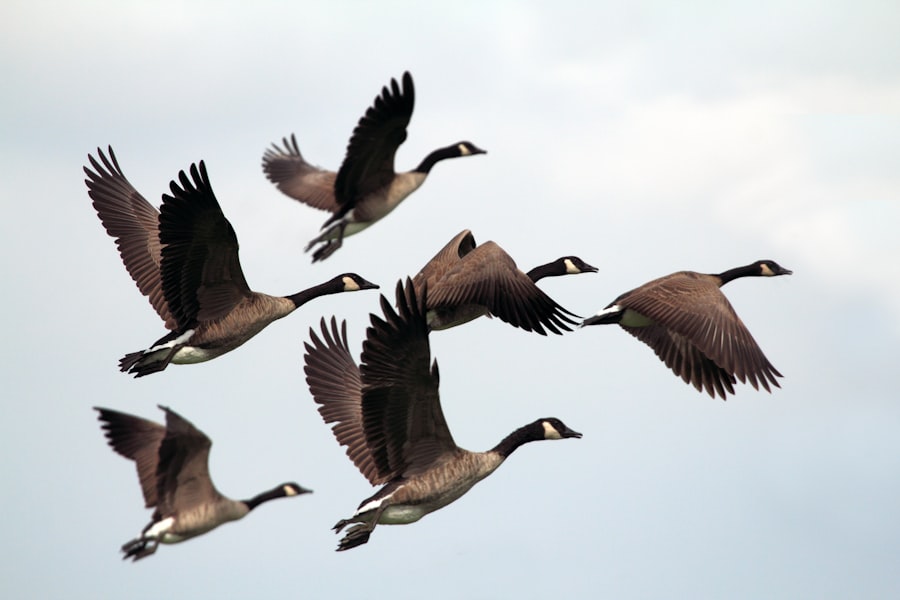
Creating a hostile environment for geese is another effective way to keep them off lawn decoys. One method is to use sound deterrents, such as ultrasonic devices or noise makers, that emit sounds that are unpleasant for geese. These devices can be placed around the perimeter of the lawn to create a hostile environment that discourages geese from entering the area.
Another way to create a hostile environment for geese is to use motion-activated sprinklers. These devices can be set up to spray water when they detect movement, which can startle and deter geese from entering the area. Additionally, motion-activated sprinklers can help keep lawns and gardens watered while also keeping geese at bay.
Long-Term Solutions for Keeping Geese Off Lawn Decoys
In addition to the short-term solutions mentioned above, there are also long-term strategies that can be used to keep geese off lawn decoys. One effective long-term solution is habitat modification. By making changes to the landscape, such as adding natural barriers or altering the terrain, you can create an environment that is less attractive to geese.
Another long-term solution is habitat management. This involves making changes to the ecosystem in order to create a more balanced environment that is less attractive to geese. This may involve planting native vegetation, creating wetlands or other natural habitats, and managing water levels to discourage geese from congregating in the area.
In conclusion, keeping geese off lawn decoys is important for protecting your property from damage and creating a safe and enjoyable outdoor environment. By understanding the reasons why geese are attracted to your lawn and implementing a combination of natural deterrents, physical barriers, repellents, scare tactics, and long-term solutions, you can effectively keep geese at bay and enjoy your outdoor space without interference from these beautiful but troublesome birds.
Looking for effective ways to keep geese off your lawn? Check out this insightful article on Poultry Wizard that offers practical tips and solutions. Whether you’re dealing with geese damaging your property or simply want to maintain a goose-free environment, this article provides valuable information to help you address the issue.
FAQs
What are decoys used for in keeping geese off the lawn?
Decoys are used to create the illusion of a predator or threat in order to deter geese from landing or feeding on the lawn.
What types of decoys are effective in keeping geese off the lawn?
Decoys that resemble natural predators of geese, such as coyotes, dogs, or owls, are effective in deterring geese from the lawn.
How should decoys be placed to effectively keep geese off the lawn?
Decoys should be strategically placed in areas where geese are likely to land or feed, and they should be moved regularly to maintain their effectiveness.
Are there any other methods that can be used in conjunction with decoys to keep geese off the lawn?
Other methods that can be used in conjunction with decoys include installing fencing, using noise deterrents, and applying repellents to the lawn.
Are there any legal considerations when using decoys to keep geese off the lawn?
It is important to check local regulations and laws regarding the use of decoys and other methods to deter geese, as some areas may have restrictions or guidelines in place.
Meet Walter, the feathered-friend fanatic of Florida! Nestled in the sunshine state, Walter struts through life with his feathered companions, clucking his way to happiness. With a coop that’s fancier than a five-star hotel, he’s the Don Juan of the chicken world. When he’s not teaching his hens to do the cha-cha, you’ll find him in a heated debate with his prized rooster, Sir Clucks-a-Lot. Walter’s poultry passion is no yolk; he’s the sunny-side-up guy you never knew you needed in your flock of friends!

